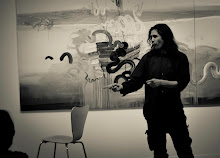Performer's Notes on the 'Standing Up for Freedom' Show.
Hegel is certainly right (not a sentence I have much use for normally). Ideas are strange slippery things, and in thinking them we are transformed beyond any one time, and somehow caught up in the drama, in the struggles and in the language of the past. What is more, Hegel is surely quite correct when he suggests that there is a difference between those ideas that we are silently thinking without realising it, and which infuse both our assumptions, and feelings, and those ideas which we are enacting consciously and deliberately. I mean, both are silently thinking their history in us, but in a different ways, and at a different rhythm.
To follow an idea, which is so central to our modern self, such as freedom, across time, is to watch that idea (and so the modern mind) emerge, through many stages and epochs: Ideas that are at one time just silent and implicit becoming explicit, but then are lost again, or found in a different context and in different places. The very ideas one lives by are thereby opened out, and become, in a sense, characters in their own drama, with their own story to tell. The aim of this show is therefore to catch the audience up in this drama, which is after all, also their drama, for it speaks a lot to and with, the ideas that fill and reverberate around all our minds.
In addition there is a real fascination in going backwards through history, one akin surely to following a river back to the source. Now I am not an essentialist, and do not believe that the past is 'purer', or that freedom was more 'free' there, but as a performer I know the gathering power of going backwards in time. The audience feels the urgency build, as we come closer and closer to the finale of the show - in this case the Trial of Socrates, a moment when the main threads of Western thought were first clearly enunciated, and the adventure really got going. To ride piggy back on that energy, that power of flowing the wrong way in time, is a delight. For it gives a pattern and power to the ideas. More than that, it provides a strong framework for the pieces, that by themselves might be hard to place, however good the ideas (and their performance) are. In short to run backwards in time, is to already have caught up the audience on the journey.
But if you want to judge for yourself whether it works: A playlist from my first performance of my new 'Standing Up for Freedom' show is here:


No comments:
Post a Comment